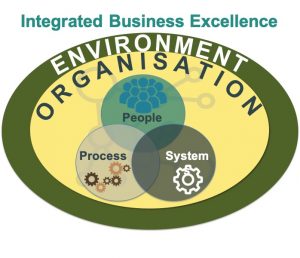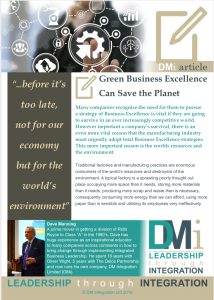Green Business Excellence Can Save the Planet
Many companies recognise the need for them to pursue a strategy of Business Excellence is vital if they are going to survive in an ever increasingly competitive world. However important a company’s survival, there is an even more vital reason that the manufacturing industry must urgently adopt total Business Excellence strategies. This more important reason is the worlds resources and the environment.
Traditional factories and manufacturing practices are enormous consumers of the world’s resources and destroyers of the environment. A typical factory is a sprawling poorly thought out place occupying more space than it needs, storing more materials than it needs, producing more scrap and waste than is necessary, consequently consuming more energy than we can afford, using more paper than is sensible and utilising its employees very ineffectively.
The concepts of ERP (Enterprise Resource Planning) and Six Sigma have much to commend them from a business viewpoint, but from an environmental point they are vital tools which if applied quickly and effectively could have enormous impact on the world’s environmental issues. The basic principle which sits behind Lean is the elimination of waste, when waste is defined as anything other than those resources that are absolutely essential to add value to the product. This is of course extremely complimentary to conservation and environmental issues. As companies start to apply these principles through cellular manufacturing and reducing inventories it will naturally lead to smaller factories. These smaller factories will take up less space and will take less energy to keep them operating. With less materials on site there is less chance of that materials being damaged or becoming obsolete thereby ultimately consuming less of the world’s natural resources. With the greater attention being paid to quality, this will result in less scrap and re-work once again leading to less consumption of raw materials and energy.
If manufacturing companies concentrated on simplifying production and procedural processes, they would be able to apply simpler visual and manual controls such as KANBAN within the factory. The result of this could be a significant reduction in the amount of paper consumed. The use of EDI (Electronic Date Interchange), Bar Coding and technology with suppliers would also add to the reduction in paper consumption. There are a number of companies today who electronically transmit their requirements to their suppliers on a daily or even more frequent basis. These requirements are then delivered to the customer by the supplier who is paid for them based on the quantities and usage defined on the Bill of Material. There has been no purchase order, no inspection, no invoice, no goods receipt note indeed no paper! Of course, in order to adopt this way of working the supplier must be local to the customer and have a true partnership relationship. The environment gains here also, with local supplier’s transport is greatly reduced thus saving our energy and reducing pollution. Transport systems such as “milk runs” where one supplier, carrier or even the customer sends one truck round each of his local supplier on a daily basis to pick up just the material that is needed for that days production also contribute to the transport saving. These are concepts that were developed in the 80s, why have more companies not adopted them?
In order for the benefits from a Lean or Six Sigma environment to be optimised the basic planning and control achieved through the application of a good Enterprise Resource Planning process must be in place. In other words, in order for our world to gain from Business Excellence manufacturing companies must recognise that they need to integrate the concepts of ERP, Lean and Six Sigma before it’s too late, not for our economy but for the world’s environment.

IBE Environment


